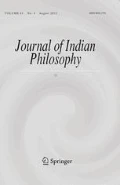Abstract
Stag tsang, amongst others, has argued that any use of mundane pramāṇa—authoritative cognition—is incompatible with the Prāsaṅgika system. His criticism of Tsongkhapa’s interpretation of Candrakīrti’s Madhyamaka which insists on the uses of pramāṇa (tha snyad pa’i tshad ma)—authoritative cognition—within the Prāsaṅgika philosophical context is that it is contradictory and untenable. This paper is my defence of Tsongkhapa’s approach to pramāṇa in the Prāsaṅgika philosophy. By showing that Tsongkhapa consistently adopts a non-foundationalist approach in his interpretation of the Prāsaṅgika’s epistemology, and by showing that he emphatically denies any place for the foundationalist epistemology of Dignāga and Dharmakīrti in the Prāsaṅgika system, I will argue that Tsongkhapa’s epistemology emerges from Stag tsang’s criticisms unscathed.
Similar content being viewed by others
References
Arnold, D. (2005). Buddhists, Brahmins and belief: Epistemology in South Asian philosophy of religion. New York: Columbia University Press.
Candrakīrti. (1994). Madhyamakavatārabhāśya. Varanasi: Sakya Students’ Welfare Committee.
Candrakīrti. (1996). Catuḥśatakaṭıkā. Varanasi: Kargyud Students’ Welfare Committee.
Candrakīrti. (2003). Mūlamadhyamakavṛṭṭiprasannapadā. Sarnath: Gelukpa Students’ Welfare Committee.
Dge ‘ndun chos ‘phel. (1990). Dbu ma’i zab gnad snying por dril ba’i legs bshad klu sgrub dgongs rgyan. Lhasa: bod ljongs bod yid dbe rnying khang.
Gorampa bsod nams senge. (2002). Dbu ma’i de kho na nyid spyi’i don ngag gis ston pa nges don rab gsal. Sarnath: Sakya Students’ Union.
Jam dbyang Bzhad pa Ngag dbang Brtson grus. (2006). Tshigs gsal stong thum gyi tshad ma’i rnam bshad. In the Dpal Dge ldan pa’i tshad ma rig pa’i gzhung gces btus of Bod kyi gtsug lag gces btus vol. 21. New Delhi: Institute of Tibetan Classics.
Karma pa mi skyod rdo rje. (2006). Dbu ma la ‘jug pa’i ṭīka dwags rgyud grub pa’i shing rta. Varanasi: Vajra Vidya Institute.
Nāgājuna. (1996). Mūlamadhyamakakārika. In rtsa ba phyogs bsdus. Varanasi: Sakya Students’ Welfare Committee.
Nāgājuna. (2005). Vigrahavyāvartanī. In Bhattarcharya et al. (Trans.), The dialectical method of Nāgājuna: Vigrahavyāvartanī. Delhi: Motilal Banarsidass Publishers Private Limited.
Nāgārjuna. (1998). Rtsod pa ldog pa’i bstan cos kyi ‘grel pa (Vigrahavyāvartanīkārika). In G. Tucci (Trans.), Pre-Dinnāga Buddhist texts on logic from Chinese sources. Kathmandu: Pilgrims Books House.
Rong ston śākya rgyal mtshan. (1995). Dbu ma tsa ba’i rnam bshad zab mo’i di kho na nyid snang ba. Sarnath: Sakya Students’ Union.
Śākya mchog ldan. (1975). Dbu ma rtsa ba’i rnam bshad skal bzang ‘jug ngogs. In The complete works (Vol. 5). Thimpu, Bhutan: Kunzang Tobgey.
Siderits, M. (1981). The Madhyamaka critique of epistemology II. Journal of Indian Philosophy, 9, 121–160.
Stag tsang lotsāwa. (2007a). Grub mtha’ kun shes nas mtha’ bral sgrub pa zhes bya ba’i bstan cos. In The collected works of Stag tsang lotsāwa shes rab rinchen. Peking: bod rig pa dpe skrun khang.
Stag tsang lotsāwa. (2007b). Grub mtha’ kun shes nas mtha’ bral sgrub pa zhes bya ba’i stan cos rnam par bshad pa legs bshad rgya mtsho. In The collected works of Stag tsang lotsāwa shes rab rinchen. Peking: bod rig pa dpe skrun khang.
Stag tsang lotsāwa. (2007c). Rje btsun blo bzang grags pa’i ngang tshul cung zad brjod pa bzhugs so. In The collected works of Stag tsang lotsāwa shes rab rinchen. Peking: bod rig pa dpe skrun khang.
Thakchoe, S. (2007). The two truths debate: Tsongkhapa and gorampa on the middle way. Boston: Wisdom Publications.
Thakchoe, S. (2011). Prāsaṅgika epistemology in context. In Cowherds’ moonshadows: Conventional truth in Buddhist philosophy (pp. 39–56). Oxford: Oxford University Press.
Tillemans, T. J. F. (2003). Metaphysics for Mādhyamikas. In G. Drefus (Ed.), The Svātantrika–Prāsaṅgika distinction: What difference does a difference make?. Boston: Wisdom Publications.
Tsongkhapa blo bzang drags pa. (1984). Dgongs pa rab gsal, dbu ma dgongs pa rab gsal. Sarnath: Gelugpa Students’ Welfare Committee.
Tsongkhapa blo bzang drags pa. (1993). Byang chub lam gyi rim pa chen mo. Sarnath: Gelugpa Students’ Welfare Committee.
Tsongkhapa blo bzang drags pa. (2004). Dbu ma dgongs pa rab gsal. Sarnath: Gelugpa Students’ Welfare Committee.
Author information
Authors and Affiliations
Corresponding author
Rights and permissions
About this article
Cite this article
Thakchoe, S. Prāsaṅgika Epistemology: A Reply to Stag tsang’s Charge Against Tsongkhapa’s Uses of Pramāṇa in Candrakīrti’s Philosophy. J Indian Philos 41, 535–561 (2013). https://doi.org/10.1007/s10781-013-9186-3
Published:
Issue Date:
DOI: https://doi.org/10.1007/s10781-013-9186-3



